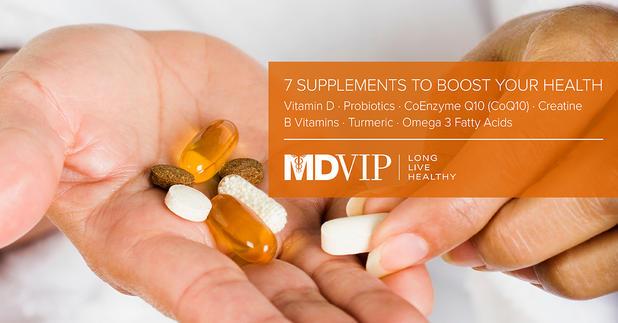Ditch Your Multivitamin and Ask Your Primary Care Doctor About These 7 Vitamins and Supplements

Back in the day, all you had to do to get your nutrients was to eat a healthy diet. However, we’re living in an age of fast foods, processed meals and GMOs, which is why primary care physicians have begun recommending supplements to maintain optimal health.
But the dizzying array of vitamins and supplements on the market can be confusing and has led many people using multivitamins, which are ineffective. So, which ones do you need? And, can they really affect your health? Questions like these are why it’s important to discuss supplements with your physician even though many people do not; a recent study published in the Journal of the American Medical Association (JAMA) suggested that 25 percent of adults don’t tell their doctors when they use supplements.
When I was discussing this issue with my colleague Leslie Emhof, MD, an MDVIP-affiliated family practitioner and geriatrician, he pointed out that, "As Americans search for key ingredients to healthy living and preventing disease, the simple answer may be in what patients lack in their daily diets. Supplements simply ‘supplement.’ They are not a rescue from poor habits or a replacement for healthy eating.”
As an MDVIP-affiliated internist in Baltimore, I approach my patients’ nutritional needs by sharp shooting with specific supplements, rather than taking a shotgun approach. I implore my patients to do their best with diet and exercise first and then add supplements to get even better.
Dr. Emhof practices in a similar fashion and adds that, "Many supplements CAN interact with prescription medications, which is why it is SO IMPORTANT for patients to run any new supplements they plan on taking past their doctor."
Below are Dr. Emhof and my top seven recommended vitamins and supplements.
- Vitamin D - is necessary for good bone health, helps maintain memory and cognitive function, strengthens immune system and assists with nerve function.
- Probiotics - help foster healthy bacteria in your digestive system which can help keep your digestive system healthy and immune system strong.
- CoQ10 - prevents cellular damage that can contribute to the development of age-related diseases, as well as muscle pain and weakness among people taking cholesterol medications.
- Creatine - provides energy to muscles, making them more powerful. It's helpful to take creatine if you are rehabbing an injury or training for an athletic event.
- Vitamin B12 - has several functions including maintaining an adequate energy source for cells and producing protein.
- Turmeric – may help curbs the cancer disease process and may slow down the buildup in the brain of the protein associated with Alzheimer’s disease.
- Omega 3 fatty acids – are healthy fats linked with preventing/controlling heart disease, decreasing inflammation and reducing the incidence of certain cancers.
Eating healthy diet is a common challenge among many people. Even when they double the amount of the fruits and vegetables they eat, they’re still not getting enough nutrients. Experts contribute a good portion of this problem to taking prescription drugs, as certain ones can deplete our nutrient reserves. Another culprit is processed foods. Because they are inexpensive and convenient, they have become a staple in many people’s diets but compound the problem since they are often low in nutrients and fiber but high in sugar and preservatives.
In the book Fortify Your Life, integrative health physician Tieraona Low Dog, M.D. demystifies key vitamins, minerals and supplements. She shows how to design a personalized supplement plan based on genetics, age, gender and lifestyle and gives simple guidelines on how to read labels and judge brands. She charts common prescription drugs, the depletions they cause and the supplements that counteract them.
Getting enough vitamin D is another issue, particularly for people who avoid sunlight for fear of premature aging and/or to prevent skin cancer. As a result, most people suffer from vitamin D deficiency, which causes daily aches, pains, and fatigue, worsens serious illnesses and diminishes the quality of everyday life.
Drawing on his many decades of research, Dr. Michael F. Holick reveals that our bodies need a sensible amount of unprotected sun exposure. Dr. Holick’s book, The Vitamin D Solution, offers readers an easy and inexpensive plan to reversing the effects of vitamin D deficiency--and how to enjoy a healthy life.
Your doctor should see the important role vitamin supplements can play in helping you achieve and maintain your optimal health. Please consult with your doctor before starting any diet, exercise, supplementation or medication program.


